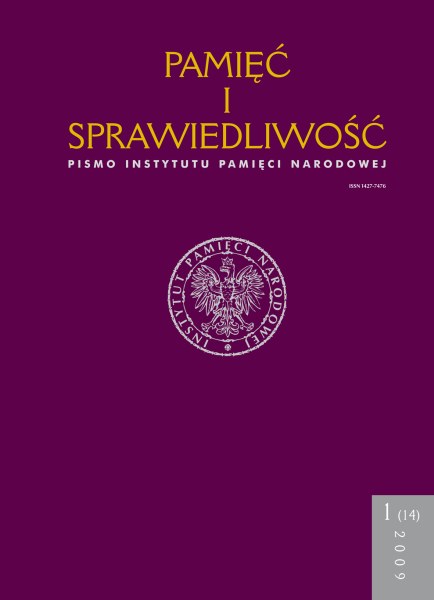Sowiecka polityka ekonomiczna na ziemiach wschodnich przedwojennej Polski (tzw. Zachodniej Ukrainie i Zachodniej Białorusi) w latach 1939–1941
Pamięć i Sprawiedliwość, Vol. 14 No 1 (2009), pages: 201-235
Publication date: 2009-12-30
Résumé
The years 1939–1941 marked a dramatic breakthrough in the economy of the eastern territories of the II RP under Soviet occupation. Not only did the USSR’s invasion mean an occupation of the territories in the classical sense of the word,
but also radically transformed the socio-economic system following the Soviet example.
Economic changes of the years 1939–1941 were incomplete, mainly because they were interrupted by the outbreak of the German–Soviet war. But even in such a short time the economic life of the occupied territories was revolutionised. First of all, the pre-war ownership structure of the area’s economy, based on various types of ownership, was destroyed, never to be recreated again in its traditional form. There was a considerable step in the unifi cation of the territories with the economic system of the Soviet state. Reasons for the fast change included the introduction of Soviet legal and organisational structures and the lack of the territories’ self-suffi ciency in raw materials for the industry and everyday use articles. Before the war, the region was supplied with raw materials and fi nished goods, and sometimes even agricultural produce, by the central and western Poland. In the period 1939–1941, raw materials, goods and equipment were being delivered from the territory of the USSR. Supplies from the East were notoriously unreliable, but necessary for relatively stable functioning of the territories incorporated in 1939.
Thus, not only due to strictly political, but also economic reasons (lack of self-suffi ciency in raw materials and processing industry) territories of the II RP became a part of the Soviet empire in a very short time (note: a peripheral part). Their interests were subjected to the interests of the empire. This infringed upon the interests of a large group of local people who experienced a severe slump in
material and social status.
Articles les plus lus par le même auteur ou la même autrice
- Joanna Sadowska, Jerzy Eisler, Łukasz Kamiński, Marek Wierzbicki, Młodzież w PRL. Dyskusja , Pamięć i Sprawiedliwość: Vol. 17 No 1 (2011)
- Joanna Sadowska, Marek Wierzbicki, [Recenzja] Joanna Sadowska, „Sercem i myślą związani z partią”. Związek Młodzieży Socjalistycznej (1957–1976). Polityczne aspekty działalności, Wydawnictwo Trio, Warszawa 2010 , Pamięć i Sprawiedliwość: Vol. 17 No 1 (2011)
- Marek Wierzbicki, Między męczeństwem a przystosowaniem. Kościół katolicki w Europie Środkowo-Wschodniej pod rządami komunistów (1944–1989) , Pamięć i Sprawiedliwość: Vol. 29 No 1 (2017)
- Marek Wierzbicki, Białorusini polscy w okresie przełomu (1939–1945) , Pamięć i Sprawiedliwość: Vol. 6 No 2 (2004)
- Marek Wierzbicki, [Recenzje] Jerzy Grzybowski, Pogoń między Orłem Białym, Swastyką i Czerwoną Gwiazdą. Białoruski ruch niepodległościowy w latach 1939–1956, Warszawa 2011, ss. 907 , Pamięć i Sprawiedliwość: Vol. 22 No 2 (2013)
- Marek Wierzbicki, Andrzej Żbikowski, [Recenzja] W odpowiedzi na recenzję Andrzeja Żbikowskiego: Marek Wierzbicki, Polacy i Żydzi w zaborze sowieckim. Stosunki polsko-żydowskie na ziemiach północno-wschodnich II Rzeczypospolitej pod okupacją sowiecką (1939–1941), Wydawnictwo „Fronda”, Warszawa 2001, ss. 360 , Pamięć i Sprawiedliwość: Vol. 3 No 1 (2003)
 Język Polski
Język Polski
 English
English
 Deutsch
Deutsch
 Français (France)
Français (France)
 Italiano
Italiano
 Русский
Русский


 PDF (Język Polski)
PDF (Język Polski)
